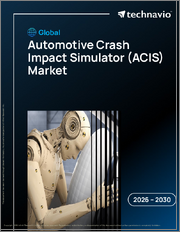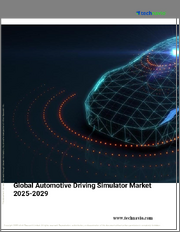
|
시장보고서
상품코드
1620509
자동차 충돌 충격 시뮬레이터 시장 기회, 성장 촉진요인, 산업 동향 분석 및 예측(2024-2032년)Automotive Crash Impact Simulator Market Opportunity, Growth Drivers, Industry Trend Analysis, and Forecast 2024 to 2032 |
||||||
자동차 충돌 충격 시뮬레이터 세계 시장은 2023년 8억 1,480만 달러로 평가되었고, 2024-2032년간 연평균 8.4% 성장할 것으로 예상됩니다. 이러한 시뮬레이터를 통해 제조업체는 차량 설계를 가상으로 테스트할 수 있어 기존 충돌 테스트에 소요되는 시간과 비용을 크게 절감할 수 있습니다. 첨단 시뮬레이션 기술을 활용하면 자동차 제조업체는 차량의 안전 기능을 효율적으로 분석하고 강화할 수 있어 비용 효율성과 개발 프로세스 속도를 높일 수 있습니다. 시장은 추진력에 따라 내연기관차(ICE)와 전기자동차로 구분되며, 2023년 시장 점유율은 ICE가 75% 이상을 차지하고 2032년에는 12억 달러 이상에 달할 것으로 예상됩니다. 자동차 제조업체들은 안전성을 희생하지 않고 충돌 안전성을 유지하기 위해 내연기관 차량에 고강도 강철이나 복합재와 같은 경량 소재를 사용하고 있습니다. 충돌 충격 시뮬레이터는 이러한 혁신적인 소재의 탄력성을 평가하고 경량화에도 불구하고 안전 기준을 유지하는 데 중요한 역할을 하고 있습니다.
시뮬레이션 유형별로 보면, 자동차 충돌 충격 시뮬레이터 시장에는 HIL(Hardware-in-the-Loop), 소프트웨어 시뮬레이션, 실물 크기 충돌 테스트가 포함되며, HIL 시뮬레이션은 검사 프로세스를 효율화할 수 있기 때문에 2032년까지 8억 5,000만 달러 이상 시장 규모를 형성할 것으로 예상됩니다. HIL 시뮬레이션을 통해 자동차 제조업체는 물리적 프로토타입의 필요성을 줄여 시간과 비용을 절감하고 개발 기간을 크게 단축할 수 있습니다. 빠른 기술 혁신이 요구되는 자동차 산업에서 가상 테스트 방법은 제조업체가 안전 표준을 훼손하지 않고 새로운 모델을 신속하게 시장에 출시할 수 있는 방법을 제시합니다.
미국 자동차 충돌 충격 시뮬레이터 시장은 2032년까지 4억 3,000만 달러에 달할 것으로 예상됩니다. 미국에 본사를 둔 자동차 OEM과 공급업체들은 인공지능, 머신러닝, 실시간 데이터 처리를 통한 첨단 충돌 시뮬레이션 기술을 빠르게 도입하여 충돌 테스트의 정확성과 속도를 높이고 있습니다. 이러한 첨단 시뮬레이션을 통해 자동차 제조업체는 물리적 검사 요건을 줄이고, 설계 개선을 가속화하며, 차량 안전 기능을 최적화하여 시장 경쟁력을 유지할 수 있습니다. 이러한 기술 발전을 통해 미국 제조업체들은 개발 비용을 절감하는 동시에 엄격한 안전 기준을 충족할 수 있게 되어 차량 안전 혁신의 선두주자로 자리매김할 수 있게 되었습니다.
| 시장 범위 | |
|---|---|
| 시작 연도 | 2023년 |
| 예측 연도 | 2024-2032년 |
| 시작 금액 | 8억 1,480만 달러 |
| 예상 금액 | 16억 달러 |
| CAGR | 8.4% |
목차
제1장 조사 방법과 조사 범위
제2장 주요 요약
제3장 산업 인사이트
- 생태계 분석
- 공급업체 상황
- 시뮬레이션 소프트웨어 프로바이더
- 자동차 OEM
- 테스트 레버러토리
- 기술 integrator
- 최종사용자
- 이익률 분석
- 차별화 기술
- 첨단 시뮬레이션 알고리즘
- 실시간 데이터 통합
- 디지털 트윈 기술
- 사용자 프렌드리 인터페이스
- 기타
- 주요 뉴스와 이니셔티브
- 규제 상황
- 영향요인
- 성장 촉진요인
- 자동차 안전성에 대한 수요 증가
- 전 세계로 증가하는 교통사고
- 시뮬레이션 모델 개발비 낮음
- 자율주행차나 전기자동차에의 시프트
- 산업의 잠재적 리스크와 과제
- 밸리데이션과 물리 검사와의 상관
- 데이터 관리와 상호운용성
- 성장 촉진요인
- 성장 가능성 분석
- Porter's Five Forces 분석
- PESTEL 분석
제4장 경쟁 구도
- 서론
- 기업 점유율 분석
- 경쟁 포지셔닝 매트릭스
- 전략 전망 매트릭스
제5장 시장 추정·예측 : 차량별, 2021-2032년
- 주요 동향
- 승용차
- 해치백
- 세단
- SUV
- 상용차
- 소형 상용차(LCV)
- 대형 상용차(HCV)
제6장 시장 추정·예측 : 추진력별, 2021-2032년
- 주요 동향
- 내연기관
- 전기자동차
- 배터리 전기자동차(BEV)
- 플러그인 하이브리드 차(PHEV)
- 하이브리드차(HEV)
제7장 시장 추정·예측 : 시뮬레이션별, 2021-2032년
- 주요 동향
- HIL(Hardware-in-the-Loop)
- 소프트웨어 시뮬레이션
- 실물 크기 충돌 검사
제8장 시장 추정·예측 : 용도별, 2021-2032년
- 주요 동향
- 차량 설계·개발
- 충돌 안전 평가
- 운전자와 동승자 안전성 조사
- 기타
제9장 시장 추정·예측 : 지역별, 2021-2032년
- 주요 동향
- 북미
- 미국
- 캐나다
- 유럽
- 영국
- 독일
- 프랑스
- 스페인
- 이탈리아
- 러시아
- 북유럽
- 아시아태평양
- 중국
- 인도
- 일본
- 한국
- 뉴질랜드
- 동남아시아
- 라틴아메리카
- 브라질
- 멕시코
- 아르헨티나
- 중동 및 아프리카
- 아랍에미리트(UAE)
- 남아프리카공화국
- 사우디아라비아
제10장 기업 개요
- Altair
- Ansys
- Autono
- AVSimulation
- Cruden
- Dassault Systems
- Delta-V Experts
- Encocam
- Enteknograte
- ESI Group
- Hexagon
- Humanetics
- Illinois Tool Works
- MathWorks
- Mitsubishi Heavy Industries
- Siemens
- Tecosim
- TUV SUD
- VI-grade
- Virtual Crash
The Global Automotive Crash Impact Simulator Market, valued at USD 814.8 million in 2023, is expected to grow at an 8.4% CAGR from 2024 to 2032. These simulators empower manufacturers to test vehicle designs virtually, drastically reducing both the time and costs associated with traditional crash testing. By leveraging advanced simulation technologies, automakers can efficiently analyze and enhance vehicle safety features, which translates to cost-effective and faster development processes-an invaluable advantage in today's competitive automotive landscape where speed to market is essential. The market is segmented by propulsion into internal combustion engine (ICE) vehicles and electric vehicles, with the ICE segment dominating over 75% of the market share in 2023 and expected to surpass USD 1.2 billion by 2032. Automakers increasingly utilize lightweight materials like high-strength steel and composite materials in ICE vehicles, striving to maintain crashworthiness without sacrificing safety. Crash impact simulators play a crucial role in assessing the resilience of these innovative materials and ensuring that safety standards are upheld despite weight reductions.
In terms of simulation type, the automotive crash impact simulator market includes hardware-in-the-loop (HIL), software simulation, and full-scale crash testing. By 2032, HIL simulation is projected to exceed USD 855 million due to its ability to streamline the testing process. HIL simulations allow automakers to save both time and money by reducing the need for physical prototypes, which significantly shortens the development timeline. In an industry driven by the demand for rapid innovation, virtual testing methods offer manufacturers a way to swiftly bring new vehicle models to market without compromising safety standards.
In the United States, the automotive crash impact simulator market is expected to reach USD 430 million by 2032. U.S.-based automotive OEMs and suppliers are swiftly embracing advanced crash simulation technologies powered by artificial intelligence, machine learning, and real-time data processing, which enhance both the precision and speed of crash testing. With these advanced simulations, automakers can reduce physical testing requirements, accelerate design improvements, and optimize vehicle safety features to maintain a competitive edge in the market. These technological advancements enable U.S. manufacturers to reduce development costs while simultaneously meeting stringent safety standards, positioning them as leaders in innovative vehicle safety.
| Market Scope | |
|---|---|
| Start Year | 2023 |
| Forecast Year | 2024-2032 |
| Start Value | $814.8 Million |
| Forecast Value | $1.6 Billion |
| CAGR | 8.4% |
Table of Contents
Chapter 1 Methodology & Scope
- 1.1 Research design
- 1.1.1 Research approach
- 1.1.2 Data collection methods
- 1.2 Base estimates and calculations
- 1.2.1 Base year calculation
- 1.2.2 Key trends for market estimates
- 1.3 Forecast model
- 1.4 Primary research & validation
- 1.4.1 Primary sources
- 1.4.2 Data mining sources
- 1.5 Market definitions
Chapter 2 Executive Summary
- 2.1 Industry 360° synopsis, 2021 - 2032
Chapter 3 Industry Insights
- 3.1 Industry ecosystem analysis
- 3.2 Supplier landscape
- 3.2.1 Simulation software providers
- 3.2.2 Automotive OEM
- 3.2.3 Testing laboratories
- 3.2.4 Technology integrators
- 3.2.5 End users
- 3.3 Profit margin analysis
- 3.4 Technology differentiators
- 3.4.1 Advanced simulation algorithms
- 3.4.2 Real-time data integration
- 3.4.3 Digital twin technology
- 3.4.4 User-friendly interfaces
- 3.4.5 Others
- 3.5 Key news & initiatives
- 3.6 Regulatory landscape
- 3.7 Impact forces
- 3.7.1 Growth drivers
- 3.7.1.1 Increasing demand for vehicle safety
- 3.7.1.2 Growing road accidents across the globe
- 3.7.1.3 Low cost of development for simulation models
- 3.7.1.4 Shift towards autonomous and electric vehicles
- 3.7.2 Industry pitfalls & challenges
- 3.7.2.1 Validation and co-relation with physical tests
- 3.7.2.2 Data management and interoperability
- 3.7.1 Growth drivers
- 3.8 Growth potential analysis
- 3.9 Porter's analysis
- 3.10 PESTEL analysis
Chapter 4 Competitive Landscape, 2023
- 4.1 Introduction
- 4.2 Company market share analysis
- 4.3 Competitive positioning matrix
- 4.4 Strategic outlook matrix
Chapter 5 Market Estimates & Forecast, By Vehicle, 2021 - 2032 ($Bn)
- 5.1 Key trends
- 5.2 Passenger vehicles
- 5.2.1 Hatchback
- 5.2.2 Sedan
- 5.2.3 SUV
- 5.3 Commercial vehicles
- 5.3.1 Light commercial vehicles (LCV)
- 5.3.2 Heavy commercial vehicles(HCV)
Chapter 6 Market Estimates & Forecast, By Propulsion, 2021 - 2032 ($Bn)
- 6.1 Key trends
- 6.2 ICE
- 6.3 Electric vehicles
- 6.3.1 Battery electric vehicles(BEV)
- 6.3.2 Plug-in hybrid electric vehicles(PHEV)
- 6.3.3 Hybrid electric vehicles(HEV)
Chapter 7 Market Estimates & Forecast, By Simulation, 2021 - 2032 ($Bn)
- 7.1 Key trends
- 7.2 Hardware-in-the-loop simulation
- 7.3 Software simulation
- 7.4 Full-scale crash testing
Chapter 8 Market Estimates & Forecast, By Application, 2021 - 2032 ($Bn)
- 8.1 Key trends
- 8.2 Vehicle design & development
- 8.3 Crash safety assessment
- 8.4 Driver & passenger safety studies
- 8.5 Others
Chapter 9 Market Estimates & Forecast, By Region, 2021 - 2032 ($Bn)
- 9.1 Key trends
- 9.2 North America
- 9.2.1 U.S.
- 9.2.2 Canada
- 9.3 Europe
- 9.3.1 UK
- 9.3.2 Germany
- 9.3.3 France
- 9.3.4 Spain
- 9.3.5 Italy
- 9.3.6 Russia
- 9.3.7 Nordics
- 9.4 Asia Pacific
- 9.4.1 China
- 9.4.2 India
- 9.4.3 Japan
- 9.4.4 South Korea
- 9.4.5 ANZ
- 9.4.6 Southeast Asia
- 9.5 Latin America
- 9.5.1 Brazil
- 9.5.2 Mexico
- 9.5.3 Argentina
- 9.6 MEA
- 9.6.1 UAE
- 9.6.2 South Africa
- 9.6.3 Saudi Arabia
Chapter 10 Company Profiles
- 10.1 Altair
- 10.2 Ansys
- 10.3 Autono
- 10.4 AVSimulation
- 10.5 Cruden
- 10.6 Dassault Systems
- 10.7 Delta-V Experts
- 10.8 Encocam
- 10.9 Enteknograte
- 10.10 ESI Group
- 10.11 Hexagon
- 10.12 Humanetics
- 10.13 Illinois Tool Works
- 10.14 MathWorks
- 10.15 Mitsubishi Heavy Industries
- 10.16 Siemens
- 10.17 Tecosim
- 10.18 TUV SUD
- 10.19 VI-grade
- 10.20 Virtual Crash



















